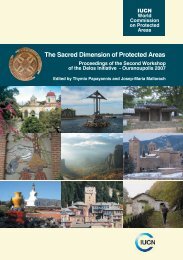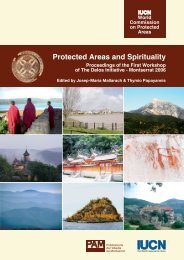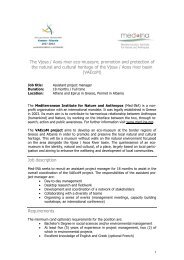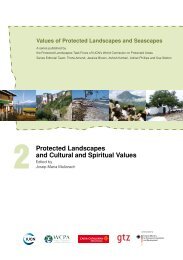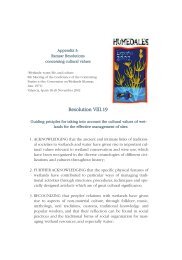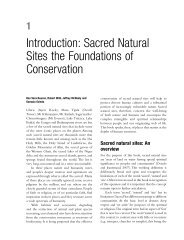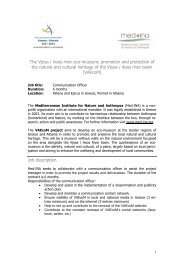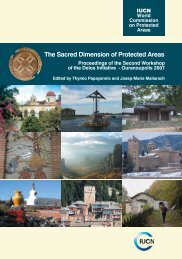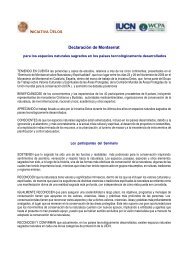The Diversity of Sacred Lands in Europe - IUCN
The Diversity of Sacred Lands in Europe - IUCN
The Diversity of Sacred Lands in Europe - IUCN
Create successful ePaper yourself
Turn your PDF publications into a flip-book with our unique Google optimized e-Paper software.
experience as part <strong>of</strong> the heal<strong>in</strong>g <strong>of</strong> the<br />
body (Clarke 2010). Why should it not<br />
also be a new field for conservationists<br />
who have a responsibility for planetary<br />
health? So do<strong>in</strong>g can allow park managers<br />
to optimise their assets. It can synergise<br />
benefits across an extended spectrum,<br />
thereby ultimately strengthen<strong>in</strong>g<br />
the political will to susta<strong>in</strong> and resource<br />
nature conservation.<br />
In h<strong>in</strong>t<strong>in</strong>g that ‘nature is good for the<br />
soul’ the hard-pressed biological scientist<br />
should not be expected to become<br />
an authority <strong>in</strong> spiritual matters. However,<br />
it may be useful to know that an extensive<br />
body <strong>of</strong> research and literature<br />
has build up over the past century, culm<strong>in</strong>at<strong>in</strong>g<br />
<strong>in</strong> the field <strong>of</strong> consciousness<br />
research. An early milestone was William<br />
James’s classic study, <strong>The</strong> Varieties<br />
<strong>of</strong> Religious Experience, first presented<br />
as the Gifford Lectures <strong>in</strong> ‘natural religion’<br />
at Ed<strong>in</strong>burgh University between<br />
1900 and 1902. <strong>The</strong> twentieth century<br />
saw further experimental and conceptual<br />
advances. A f<strong>in</strong>e review <strong>of</strong> the literature<br />
is Varieties <strong>of</strong> Anomalous Experience:<br />
Exam<strong>in</strong><strong>in</strong>g the Scientific Evidence<br />
published the American Psychological<br />
Association (Cardena et al. 2000). Especially<br />
relevant is the last chapter by<br />
Wulff on mystical experience.<br />
Weak and strong sacred<br />
experience<br />
A range <strong>of</strong> terms have been devised to<br />
describe religious and related ‘anomalous’<br />
experiences such as might be associated<br />
with either the found<strong>in</strong>g<br />
‘sa<strong>in</strong>tly’ figures beh<strong>in</strong>d SNSs, or with<br />
subsequent experiences reported by<br />
visitors. <strong>The</strong> theologian may speak <strong>of</strong><br />
experiences as ‘visionary’ or ‘mystical’.<br />
Rudolf Otto used the word ‘num<strong>in</strong>ous’<br />
<strong>in</strong> popularis<strong>in</strong>g ‘the idea <strong>of</strong> the holy’.<br />
<strong>The</strong> humanistic psychologist Abraham<br />
Maslow, best known for his hierarchy<br />
<strong>of</strong> human needs, devised the term<br />
‘peak experience’. This latter term allows<br />
the <strong>in</strong>clusion <strong>of</strong> experiences that<br />
may not have an explicit religious connotation<br />
but is still perceived as uplift<strong>in</strong>g<br />
to the ‘spirit’. All <strong>of</strong> these comprise<br />
an area <strong>of</strong> study known as ‘transpersonal<br />
psychology’ For our purposes it<br />
is helpful to follow Wulff (<strong>in</strong> Cardena et<br />
al. 2000: 397–460) <strong>in</strong> recognis<strong>in</strong>g a<br />
cont<strong>in</strong>uum from mild to extreme (or<br />
weak to strong) transpersonal experiences<br />
– so-called because they suggest<br />
a realm <strong>of</strong> experience that lifts<br />
consciousness beyond normal egobounded<br />
limitations.<br />
Weak peak experience (to use Maslow’s<br />
term) is very common outdoors.<br />
<strong>The</strong>se <strong>in</strong>clude mildly <strong>in</strong>tensified aesthetic<br />
experiences with nature and<br />
close bond<strong>in</strong>g with fellow humank<strong>in</strong>d.<br />
For example, a mildly euphoric feel<strong>in</strong>g<br />
<strong>of</strong> closeness to one’s friends might be<br />
memorably felt while mutually witness<strong>in</strong>g<br />
a breath-tak<strong>in</strong>g sunset.<br />
R<strong>in</strong>ger and Gillis (1995) have <strong>in</strong>dicated<br />
the importance <strong>of</strong> outdoor tra<strong>in</strong>ers understand<strong>in</strong>g<br />
that such weak experiences<br />
can readily escalate to strong levels<br />
<strong>of</strong> psychological depth. <strong>The</strong>y propose<br />
an eight-po<strong>in</strong>t scale rang<strong>in</strong>g from surface-level<br />
aesthetic experiences,<br />
through deepen<strong>in</strong>g levels <strong>of</strong> identity formation,<br />
all the way to the ‘universal lev-<br />
233



